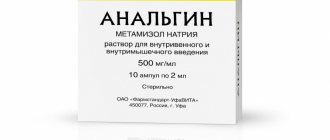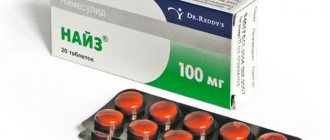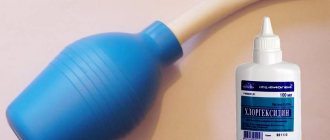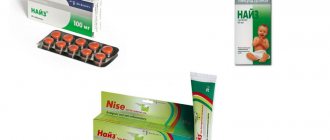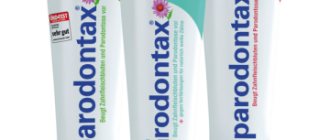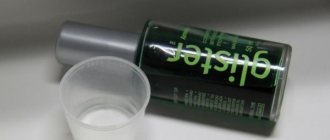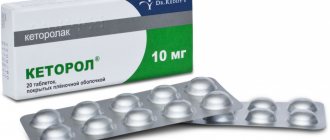Pain management is the most common process in all of medicine. There are many ways to relieve pain of all kinds (from using any cold object to surgical methods), but one of the simplest, most common and effective is medication, namely by taking pills.
Today, drugs such as Ketorol and Ketonal are extremely popular. These drugs can be used both in tablet form and in injection form, however, tablets, due to their ease of use, high availability and equally high effectiveness, are replacing the injection forms of these drugs in terms of prevalence.
Every person should clearly know that despite their names being very similar to each other and the general class of medications, Ketonal and Ketorol are different drugs. This difference needs to be understood in detail.
Characteristics of Ketonal
This is a non-narcotic, non-hormonal drug, characterized by antipyretic, anti-inflammatory and analgesic properties. It helps relieve moderate and severe pain of various origins, for example, with colic, neuralgia, myalgia, radiculitis, osteoarthritis, spondylitis, arthritis, etc.
Dosage forms of Ketonal:
- pills;
- gel;
- cream;
- rectal suppositories;
- solution in ampoules for intravenous or intramuscular administration;
- capsules.
The main active component of the drug is ketoprofen. This substance belongs to the group of nonsteroidal anti-inflammatory drugs (NSAIDs). A distinctive feature of the drug is the provision of a wide range of analgesic effects, distributed to the peripheral and central nerve fibers that are responsible for the perception of pain impulses. Therefore, Ketonal is often used for pain in joints, muscles, and ligaments. The drug reduces inflammatory reactions, which helps relieve pain in joint diseases and relieves morning stiffness.
Tablets, injections, suppositories and capsules are prescribed for the treatment of degenerative or inflammatory diseases of cartilage, ligaments, muscles, joints and bones:
- rheumatoid arthritis;
- glenohumeral syndrome;
- rheumatism;
- gout and pseudogout;
- osteochondrosis;
- osteoarthritis;
- arthrosynovitis;
- periarthritis;
- polyarthritis;
- reactive arthritis;
- ankylosing spondylitis;
- psoriatic arthritis.
To relieve pain, doctors often prescribe drugs such as Ketonal or Ketorol.
In addition, these dosage forms are prescribed to relieve severe or moderate pain in the following diseases and conditions:
- phlebitis;
- lumbago;
- lumbodynia;
- sciatica;
- radiculitis;
- neuralgia;
- myalgia;
- headache;
- bursitis;
- tendinitis;
- lymphadenitis and lymphangitis;
- pain after operations, injuries, during menstruation and malignant tumors.
Gel and ointment are indicated in the following cases:
- periarthritis and rheumatoid arthritis;
- neuralgia;
- myalgia;
- bursitis, tendinitis;
- osteoarthritis;
- reactive arthritis;
- psoriatic arthritis;
- ankylosing spondylitis;
- ruptures of tendons and muscle ligaments, sprains, bruises of ligaments and muscles, injuries to the musculoskeletal system;
- radiculitis.
Contraindications for Ketonal include:
- intolerance to drugs of the NSAID group;
- bleeding disorders;
- exacerbation of inflammatory bowel diseases (enteritis, Crohn's disease, etc.);
- exacerbation of a stomach or duodenal ulcer;
- chronic digestive disorders (constipation, diarrhea, flatulence, etc.);
- bleeding of any location (uterine, gastrointestinal, etc.);
- coronary artery bypass grafting performed less than 2 months ago;
- heart failure;
- progressive kidney disease;
- severe liver or kidney failure;
- third trimester of pregnancy;
- breastfeeding;
- children under 15 years of age.
We recommend reading: Review of painkillers of Ibuprofen and their use
Contraindications for Ketonal include: intolerance to NSAIDs, blood clotting disorders.
Cream and gel should not be applied to wounds on the skin (wetting dermatitis, eczema, open wound, etc.).
Description of "Ketanova"
The main active ingredient of the drug is ketorolac. It comes in the form of tablets for internal use and intramuscular solution. It has a strong analgesic effect. In addition, it relieves inflammation and normalizes temperature.
Among similar medications in the NSAID group, Ketanov is the most powerful. Quickly eliminates even severe pain, but does not contain narcotic substances.
Ketanov should be used to quickly block pain:
- – after surgery;
- – injuries of various origins;
- – postpartum pain;
- – tooth and muscle pain;
- – during drug withdrawal;
- – after dental procedures;
- – colic of the kidneys or gall bladder;
- – tumor;
- – joint pathologies;
- – with an inflammatory process in the sciatic nerve.
The medicine has many limitations:
- – stomach ulcer;
- – hemophilia;
- – hypocoagulation;
- – diathesis;
- - stroke;
- – bronchospasm;
- – angioedema;
- – asthma;
- – period of gestation;
- - lactation;
- – chronic pain syndrome;
- – children under 16 years of age;
- – individual intolerance to substances.
It is not recommended to take Ketanov without a doctor's prescription. The medication is very strong, so it is not suitable for daily use.
Before using a pain reliever, you should definitely consult a specialist. Taking such strong drugs on your own can cause unforeseen complications.
Characteristics of Ketorol
This is a powerful analgesic with a fairly weak antipyretic and anti-inflammatory effect. It is most often prescribed to relieve moderate to severe pain, especially associated with injuries. The drug helps if the back hurts or a person suffers from migraines, neuralgia, radiculitis. Dosage forms: tablets, gel, solution for intravenous and intramuscular administration. The main component is ketorolac.
The mechanism of action of the drug is based on its ability to block the work of cyclooxygenase, a special enzyme that converts arachidonic acid into prostaglandins. These are substances that provoke the development of pain, inflammation and an increase in body temperature. Ketorol thins the blood well, so it is prescribed with caution to people suffering from diseases associated with bleeding (stomach ulcers, hemophilia, etc.).
Indications for use of the drug:
- injuries (synovitis, tendonitis, bursitis, ligament damage, soft tissue inflammation, bruises, etc.);
- radiculitis;
- neuralgia;
- pain in joints and muscles;
- osteoarthritis;
- pain syndrome after injury.
The analgesic effect of the drug is aimed at relieving pain, but does not eliminate its cause and does not cure the underlying disease. An overdose of the gel is impossible, but if it accidentally gets into the stomach, for example, when licked from hands, lips, etc., then you need to induce vomiting and take some kind of sorbent (activated carbon, Enterosgel, Polysorb).
Overdose with injection solution and tablets is possible. It manifests itself as symptoms of poisoning: nausea, vomiting, abdominal pain. In addition, other undesirable effects of the body may be observed:
- from the gastrointestinal tract: pancreatitis, enlarged liver, hepatitis, jaundice, ulcers and erosions of the stomach, constipation, flatulence, stomatitis, diarrhea;
- from the urinary system: edema, nephritis, decrease or increase in the amount of urine, frequent urination, hemolytic uremic syndrome, azotemia, hematuria, lower back pain, acute renal failure;
- from the respiratory system: laryngeal edema, rhinitis, dyspnea, bronchospasm;
- from the central nervous system: headache, mood swings, hyperactivity, aseptic meningitis, drowsiness, dizziness, blurred vision, ringing in the ears, hearing impairment, psychosis, depression, hallucinations, anxiety;
- from the cardiovascular system: fainting, pulmonary edema, increased blood pressure;
- from the blood system: bleeding from the rectum, nose, surgical wound, leukopenia, eosinophilia;
- on the skin: rash, Lyell's syndrome, Stevens-Johnson syndrome, urticaria, exfoliative dermatitis, purpura;
- allergic reactions: itching, anaphylactic shock, shortness of breath, swelling of the eyelids, dyspnea, heaviness in the chest.
We recommend reading: Is it possible to take Dimexide and Dexamethasone at the same time?
Ketorol helps if the back hurts or a person suffers from migraines, neuralgia, radiculitis.
Ketorol is contraindicated in the following cases:
- “aspirin” asthma;
- hemorrhagic diathesis and stroke;
- renal and liver failure;
- decreased blood clotting;
- peptic ulcers;
- ulcers and erosions of the digestive organs;
- dehydration;
- hypovolemia;
- angioedema (in the past);
- bronchospasm;
- impaired hematopoiesis in the bone marrow;
- high risk of bleeding;
- simultaneous use with other NSAIDs;
- children under 16 years of age;
- pregnancy, breastfeeding;
- intolerance to the components of the drug.
Ketorol
Ketorol is a drug belonging to the class of NSAIDs (non-steroidal anti-inflammatory drugs). Kerolol is also known by the name of its active ingredient (Ketorolac). Between Ketoro and Ketorolac you can put an equal sign in the same way as between Ketonal and Ketoprofen, mentioned above. Ketorol exhibits the following effects:
- Anesthetic.
- Antipyretic.
- Anti-inflammatory.
In practice, analgesic and anti-inflammatory effects are of greatest importance. The release forms of Ketorol do not differ from those of Ketonal.
The action of Ketorol is also based on the inhibition of COX enzymes (cyclooxygenase-1 and cyclooxygenase-2). Indications for use of Ketorol:
- Migraine pain.
- Toothache.
- Postoperative period (pain in the area of postoperative wounds).
- Oncological diseases.
- Rheumatism.
- Pain in inflamed joints.
- Neurological pain.
- Severe pain during menstruation.
Comparison of Ketonal and Ketorol
To understand which product is more effective, you need to compare them.
Similarities
The similarities between the medications are as follows:
- are non-hormonal drugs with non-narcotic effects;
- have the same effect - relieve pain, eliminate inflammation and reduce body temperature;
- differ in the speed of onset of the effect;
- Available in tablets, gels and solution for injection;
- You can purchase them without a doctor's prescription.
Both drugs are taken only after consultation with a doctor who will examine the patient’s symptoms and complaints.
What is the difference?
Ketonal and Ketorol differ:
- by different manufacturers;
- different active ingredients;
- indications and contraindications.
Ketorol has several times more side effects, and they are much more dangerous. Also with contraindications.
Which is stronger and more effective?
A stronger remedy is Ketorol. It eliminates any pain well, and the effect after taking the drug comes much faster. Ketonal has a more pronounced anti-inflammatory and antipyretic effect.
Which is cheaper?
The prices for the drugs are as follows: Ketorol - 220 rubles, Ketonal - 410 rubles.
What do they have in common?
Thus, we can conclude that these two drugs are very close to each other . They are united by such characteristics as:
- Presence of analgesic effect.
- The presence of anti-inflammatory action.
- The same mechanism of action is inhibition of the activity of cyclooxygenase enzymes.
- Identical release forms.
- Over-the-counter release from pharmacies. Ketorol and Ketonal are equally accessible, since anyone can purchase these drugs without a doctor's prescription.
- Similar indications for use (some).
- Proven effectiveness.
- Rapid onset of effect.
What is better - Ketonal or Ketorol?
When choosing which drug to prescribe, the doctor studies its characteristics: indications, contraindications, development of adverse reactions. In some cases, Ketonal will cope well, in others - Ketorol.
For osteochondrosis
Only a doctor should determine which drug is best to use for osteochondrosis. It all depends on at what stage of the disease they are used. Ketonal is used for the inflammatory process that accompanies cervical chondrosis, and Ketorol effectively eliminates pain.
We recommend reading: The best chondroprotectors for spinal osteochondrosis: selection instructions and prices
For pain
When pain occurs, including headaches and dental pain, Ketorol, which is a powerful analgesic, provides better pain relief. Ketonal does not have such an effect.
For oncology
If a person experiences severe pain due to cancer, then only Ketorol can help.
For joints
Inflammatory processes occurring in the joints are well eliminated by Ketonal, and pain syndrome is eliminated by Ketorol.
Patient reviews
Elena, 33 years old, Moscow: “I recently injured my knee. I didn’t pay attention to it for several days until swelling appeared. It became difficult to walk, so I went to the doctor. The specialist prescribed Ketonal tablets. After 2-3 days the swelling subsided, the pain decreased, and after 10 days everything went away.”
Dmitry, 45 years old, Kaliningrad: “I have been suffering from chronic headaches for a long time. I am saving myself only with Ketorol, which the doctor prescribed. To achieve the desired result, I give 4 injections a day 3 times a year for a month. There have never been any side effects."
Reviews from doctors about Ketonal and Ketorol
Sergey, 40 years old, therapist, St. Petersburg: “I often prescribe Ketonal to my patients. This drug has a good anti-inflammatory effect and is a good pain reliever. It has many adverse reactions, but patients rarely complain about their occurrence. The injectable form is considered especially effective.”
Marina, 50 years old, therapist, Murmansk: “Ketorol is a strong pain reliever. I often prescribe it to patients for pain relief. It has many contraindications and dangerous side reactions, but patients practically do not complain about the drug. I often recommend using the injectable form, but tablets also show good results.”
Reviews
What do patients say about the drugs?
Lyudmila, 31 years old, Sochi
About a year ago I learned about Ketorol. I had a toothache, and a friend recommended this drug to me. Since then, these tablets have always been in my medicine cabinet. It also helps very well with headaches. However, it is better not to abuse this remedy.
Dmitry, 59 years old, Krasnoyarsk
My knee joints hurt badly. My daughter brought me “Ketanov”. The pain went away almost instantly, but my daughter warned me not to take the pills often. In this regard, I take the medicine only when the pain is unbearable. I recommend.
What do doctors say about the drugs? Doctors' opinion
Nikolai Ivanovich, 46 years old, neurologist, Irkutsk
For joint inflammation, I consider Ketorol to be the most effective remedy. It relieves inflammation and quickly eliminates pain. I prescribe only in the initial stages of the disease. This helps patients alleviate their condition. Tablets have a long list of restrictions. However, the benefits outweigh them. Available in several pharmacological forms. You can take tablets, give injections or use externally.
Irina Vladimirovna, 53 years old, dentist, Vologda
I prescribe Ketanov after surgery to remove a wisdom tooth. The drug relieves pain well. However, it is often impossible to take the medication. Otherwise, unforeseen complications may arise. The medicine may cause adverse reactions. Large list of restrictions.
Tell everyone:
